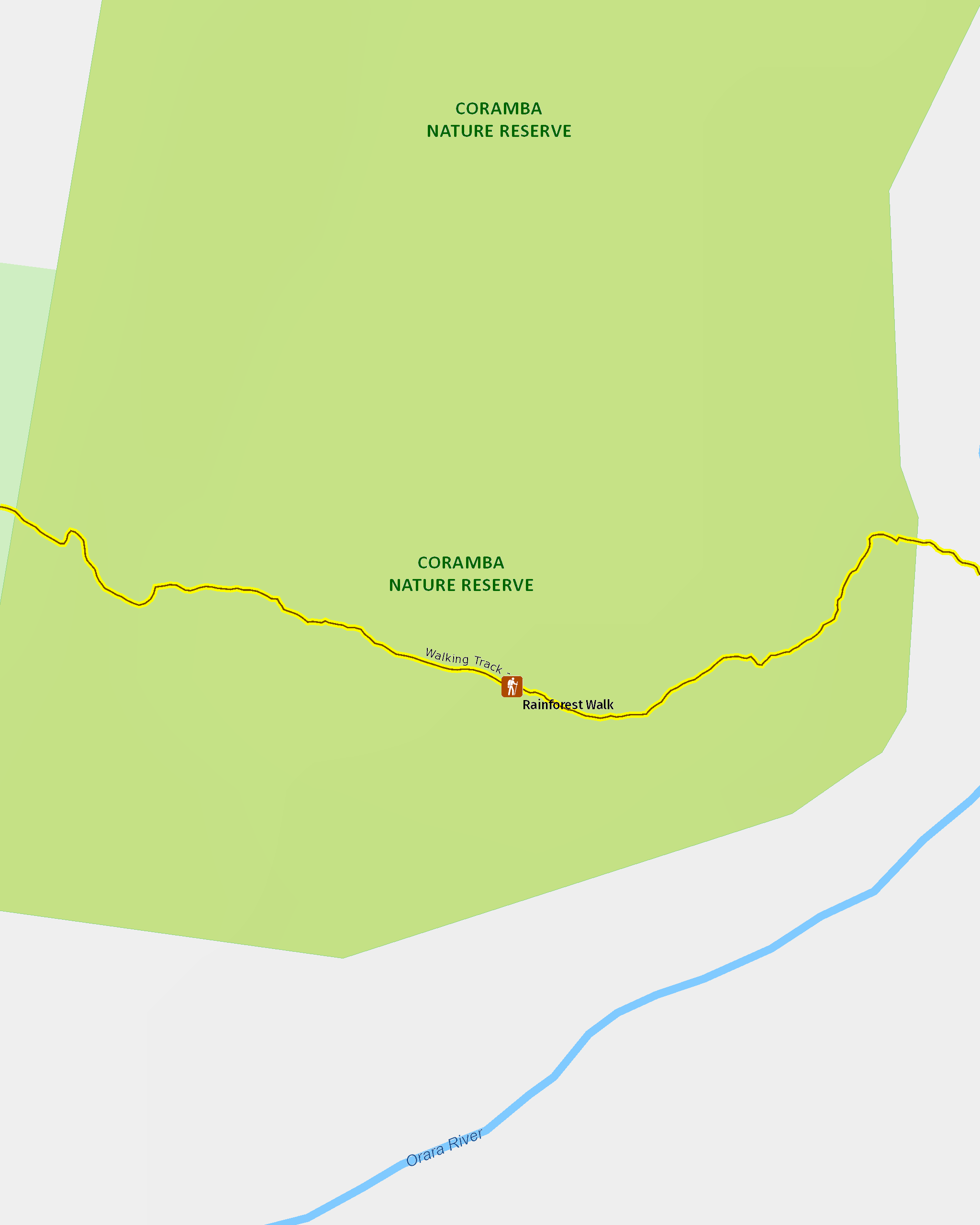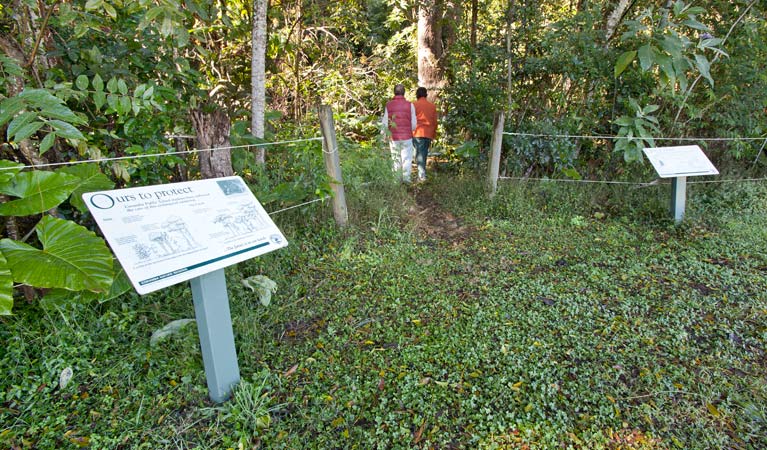Rainforest walk
Coramba Nature Reserve
Overview
Rainforest walk in Coramba Nature Reserve, near Coffs Harbour, is a great place to take a delightful stroll and enjoy birdwatching through a rare protected rainforest.
- Where
- Coramba Nature Reserve in North Coast
- Distance
- 0.8km return
- Time suggested
- 15 - 27min
- Grade
- Grade 4
- Please note
- Remember to take your binoculars if you want to go birdwatching
Few rainforest walks are as lovely as this walk found in Coramba Nature Reserve. A relaxing 800m return walk will take you down to Orara River, following under the cool canopy of the rainforest and past majestic old-growth trees.
The rainforest here is one of a few remaining stands of lowland rainforest along the Orara River and has been listed as endangered. Thankfully, a regeneration program has protected and preserved it for visitors to enjoy.
This is also a wonderful place to go birdwatching, as here you’ll spot the many native birds of the area, including rose-crowned fruit doves, figbirds, noisy pittas, brown cuckoo doves and white-headed pigeons.
Map

Map legend

Local alerts
For the latest updates on fires, closures and other alerts in this area, see https://www.nationalparks.nsw.gov.au/things-to-do/walking-tracks/rainforest-walk/local-alerts
General enquiries
- National Parks Contact Centre
- 7am to 7pm daily
- 1300 072 757 (13000 PARKS) for the cost of a local call within Australia excluding mobiles
- parks.info@environment.nsw.gov.au
Park info
- in Coramba Nature Reserve in the North Coast region
Coramba Nature Reserve is always open but may have to close at times due to poor weather, particularly flood.
Visitor info
All the practical information you need to know about Rainforest walk.
Track grading
Features of this track
Distance
0.8km return
Time
15 - 27min
Quality of markings
Limited signage
Experience required
Some bushwalking experience recommended
Gradient
Flat
Steps
No steps
Quality of path
Rough track, many obstacles
Getting there and parking
Get driving directions
Rainforest walk is in Coramba Nature Reserve. To get there:
From Coffs Harbour:
- Travel 10km northwest via Coramba Road
- Turn left into Coramba Recreation Ground
From Coramba:
- Travel 2.5km north along Orara Way
- Turn right into Coramba Recreation Ground
Parking
Parking is available on the Coramba Recreation Ground carpark adjacent to the reserve.
Best times to visit
There are lots of great things waiting for you in Coramba Nature Reserve. Here are some of the highlights.
Spring
Take a walk along Orara River and bring your binoculars to spot native birds, such as wompoo fruit doves, rose-crowned fruit doves, figbirds, noisy pitas, brown cuckoo doves and white-headed pigeons.
Summer
Escape the heat with a tranquil stroll through the rainforest down to the river, enjoying cool canopy shade.
Winter
When the weather is wet, the mushrooms are in full bloom in the reserve and you'll be able to spot some amazingly bright and beautiful colours.
Weather, temperature and rainfall
Summer temperature
Average
17°C and 29°C
Highest recorded
43.3°C
Winter temperature
Average
5°C and 20°C
Lowest recorded
-3.2°C
Rainfall
Wettest month
March
Driest month
August
The area’s highest recorded rainfall in one day
388.2mm
Maps and downloads
Prohibited
Pets
Pets and domestic animals (other than certified assistance animals) are not permitted. Find out which regional parks allow dog walking and see the pets in parks policy for more information.
Smoking
NSW national parks are no smoking areas.
Learn more
Rainforest walk is in Coramba Nature Reserve. Here are just some of the reasons why this park is special:
Aboriginal culture

The reserve's name is taken from the name of the nearby town of Coramba, which is in turn derived from the local Aboriginal Gumbaynggirr name for mountain. The land has once served as a fringe dwelling site and meeting place for the Gumbaynggirr people.
Interesting wildlife

The reserve is the only patch of lowland subtropical rainforest in the Clarence Valley that features white booyong, along with other flood-tolerant species, such as pepperberry, giant stinging tree, and one of the best stands of turnip wood in the area.
- Rainforest walk Rainforest walk in Coramba Nature Reserve, near Coffs Harbour, is a great place to take a delightful stroll and enjoy birdwatching through a rare protected rainforest.
Protected rainforest

The reserve, though small, is an important ecological community, as it is one of only a very few remaining stands of lowland rainforest along Orara River and is listed as endangered under the Threatened Species Conservation (TSC) Act. A successful rainforest regeneration program has been carried out to protect the reserve's natural resources.
- Rainforest walk Rainforest walk in Coramba Nature Reserve, near Coffs Harbour, is a great place to take a delightful stroll and enjoy birdwatching through a rare protected rainforest.
Plants and animals protected in this park
Animals
-

Long-nosed bandicoot (Perameles nasuta)
A nocturnal marsupial and one of the smaller Australian native animals, the long-nosed bandicoot is found across eastern Australia. Populations in the Sydney region have dwindled since European settlement, leaving only endangered colonies in inner western Sydney and at North Head, near Manly. The long-nosed bandicoot has grey-brown fur and a pointed snout which it uses to forage for worms and insects.
-

Grey-headed flying-fox (Pteropus poliocephalus)
The grey-headed flying fox is Australia's largest native bat, with a wingspan up to 1m. This threatened species travels up and down south-eastern Australia and plays a vital role in pollinating plants and spreading seeds in our native forests.

